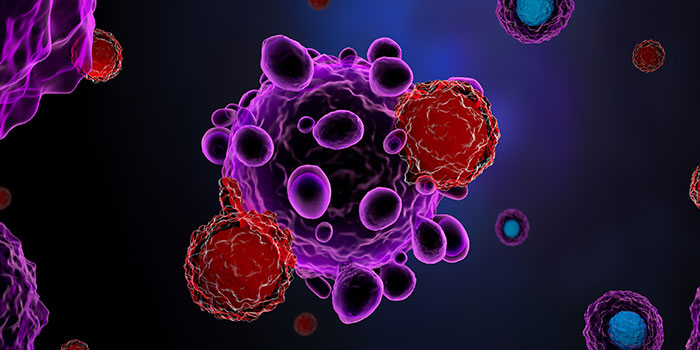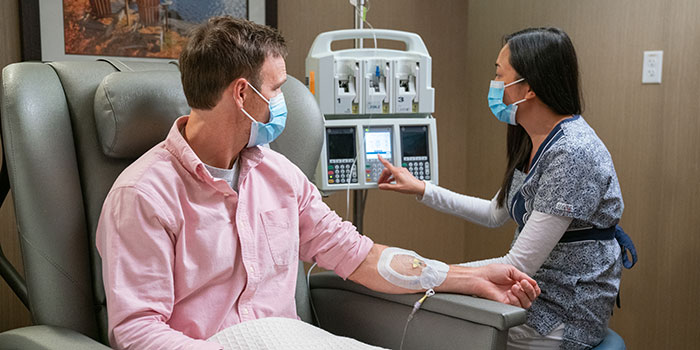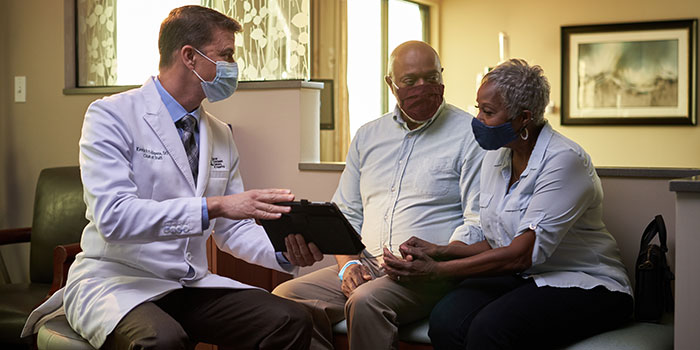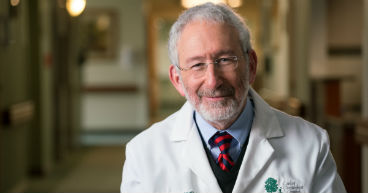
If you are a cancer patient asking yourself, “How do I change oncologists?”, you are most likely dissatisfied with some aspect of your cancer care. It’s probably not a question you ever thought you’d be asking yourself during your cancer journey, but it’s an important one.
On one hand, changing oncologists during treatment is not a decision to take lightly. But on the other hand, there can be valid reasons for patients to feel they need to make this decision.
You might be thinking of changing oncologists if:
- You feel that your doctor doesn’t spend enough time with you, isn’t listening to you or isn’t answering your questions.
- You feel like a number on a treatment conveyer belt.
- You feel like your treatment team isn’t communicating with each other, or you’re worried you or they might be missing something.
- You’re experiencing side effects that are severely affecting your quality of life or hindering your ability to continue treatment, and your care team isn’t offering any helpful solutions.
- You’re wondering if newer, more advanced cancer treatment is available.
Other times, you have no choice in the matter, especially if:
- Your oncologist is leaving the practice and you can’t follow.
- Your insurance coverage is changing, and you no longer have access to the doctor you’ve been working with.
- You’re the one who’s moving to another geographical location, and you have no choice but to find a new oncologist.
These logistical reasons that force patients into having to find a new oncologist are distressing when you’re happy with the care you’ve been getting. If you’re in this group, know that while this post primarily addresses those who are thinking of changing oncologists because they are unhappy with some aspect of their care, the information provided here may still help you find a new oncologist who meets your needs.
I want to be absolutely clear that we at Cancer Treatment Centers of America® (CTCA) would never tell a patient that he or she should find a new oncologist. It’s a very personal decision on the patient’s part. But if, for whatever reason, you’re wondering how to change oncologists, there are questions you should ask yourself and steps you should consider taking before making a decision.
Topics we’ll explore to help you through this process are:
- When is it okay to look for a new oncologist?
- Talk to your current oncologist about your concerns.
- Should you get a second opinion instead? And if so, how?
- Consider these issues before making the decision to change oncologists.
Is it ever okay to change oncologists?
Do you have the right to change oncologists, and if so—when? The simple answer is that you have the right to change oncologists any time you want. An even more reasonable answer is that you should consider a change if and when you’re uncomfortable with an important aspect of your care, and you can’t resolve that concern with your current oncologist.
In other words, decisions about your care, including who your doctor is, are yours to make, and you can make them at any time, for any reason. Of course, there are consequences to every decision and to every course of action. You want to be sure that you are making informed decisions that you’ll be comfortable with in the long run.
In general, there are two areas of care in which patients sometimes become so dissatisfied that they start thinking about finding a new oncologist: treatment options and the doctor-patient relationship.
Treatment options

After a cancer diagnosis, the doctor you see presents treatment options based on your specific cancer type and stage. Options might include surgery, radiation therapy, chemotherapy or a form of precision medicine, such as immunotherapy or targeted therapy. Sometimes, the doctor recommends a combination of therapies. In other situations, the doctor might recommend active surveillance, also known as active monitoring or watchful waiting.
Once you understand the treatment options your oncologist recommends, you have the choice to accept them, to seek another opinion or to make some other decision about your care. You are not obligated to accept your doctor’s recommendations.
Of course, that doesn’t mean the doctor you’re seeing will agree with your decisions if they’re outside what he or she feels is appropriate. For example, a doctor has the right to refuse to perform or recommend a certain surgery or to give you a certain type of therapy you’ve heard about if, in their professional opinion, they feel it’s not the appropriate course of action.
Another possibility is that your doctor may not be able to recommend any treatment options other than the ones he or she has already offered. That may feel frustrating, especially if you were hoping to have more options to choose from.
Occasionally, patients accept and begin the treatment plan but become dissatisfied later. Sometimes-debilitating side effects may make you unwilling or even unable to continue treatment. For example, if you’re unable to eat because of intense nausea, you could lose so much weight that you become too weak to tolerate treatment. If your treatment team can’t help you manage those side effects and tells you that’s your only option, you may be tempted to look elsewhere.
And then there are times that cancer continues to advance despite treatment, or you may experience a recurrence of cancer. In these scenarios, you may start questioning whether your doctor and the treatment options being offered are right for you after all. You may be interested in a clinical trial or some other advanced treatment that your doctor doesn’t have access to.
Doctor-patient relationship
Relationships can be tricky, even under the best of circumstances. Your relationship with your oncologist and care team takes on even more significance during cancer treatment and can affect your sense of well-being.
Communication styles differ from person to person, and not everyone’s needs are the same. Some patients are perfectly happy with brief, concise conversations with their doctor. Others want to have lengthy conversations and to feel that their doctor empathizes with them.
If you feel you are getting appropriate treatment but you’re unhappy with your relationship with your doctor (or with other care team members or staff in the practice), it may come down to a mismatch of communication styles. Is this crucial? That depends on how important it is to you.
At a minimum, you should feel that the doctor is being honest with you about your condition and treatment, and that he or she is presenting that information to you in a way you can understand. The doctor should do his or her best to answer your questions and to take your concerns seriously. You shouldn’t feel so rushed that you leave with unanswered questions or feel like you aren’t important. If you don’t feel you’re getting this from your doctor, you have valid concerns that need to be addressed.
Evaluate your needs and concerns carefully
If you’re unhappy with some aspect of your care and are seriously considering changing oncologists, first take a step back and carefully evaluate what you hope to accomplish with a different doctor. Perhaps you could enlist the help of a family member or someone else you trust to help you in this process.
Think through your questions, concerns and things that are making you unhappy. Is it your prognosis? Is it your treatment? Do you need more help with managing side effects? Do you need more support in some other area? Do you want a different doctor who has a better bedside manner?
Finally—and this is a tough one—is it reasonable to think that finding a new doctor will solve these issues?
Steps to take before making a decision to change your oncologist
If you’ve reached the point where you’ve identified specific areas of concern that have become intolerable to you, you should consider several other important steps and factors before you make a final decision.
Talk to your current oncologist first

This advice may be easier said than done, but start by talking to your oncologist about your concerns. You could do this at your next appointment, but it may be better to schedule an appointment just for this conversation. Bring a list of the specific issues you’ve identified.
This type of conversation isn’t easy for everyone to do. You may be worried about offending your doctor or damaging that relationship. It may feel too confrontational to those who don’t like confrontation. If that’s the case, here are several steps you can take to help make it easier:
- Practice what you want to say with a friend ahead of time. This may help you clearly state what you want to say, and your friend may be able to provide valuable feedback.
- Bring a trusted friend or caregiver with you to the appointment for support. This person may help you if you’re having a hard time articulating what you want to say or if you feel the doctor isn’t hearing what you’re trying to say.
- If you’re too uncomfortable talking to the doctor directly, you may be more comfortable talking to the oncology nurse or the nurse practitioner. Ask him or her to communicate your concerns to the doctor for you. He or she may also be able to offer other solutions that may help make a difference.
If you’ve already had a conversation with the doctor and it hasn’t had the intended effect, you can try again, or you can get a second opinion.
Consider getting a second opinion

Getting a second opinion is different from saying outright that you want to change oncologists. But it’s an option worth considering, since it may help answer some of your questions or concerns about your diagnosis, prognosis and treatment options. What you discover and experience during a second opinion may lead you to decide to change your oncologist. Or, it may mean that you decide not to make a change after all. Either way, it’s a good step to take before making a decision.
When do patients usually get a second opinion?
Everyone has the right to a second opinion. Don’t worry about offending your doctor by asking for one. Second opinions are common, and most doctors encourage it. Your doctor may even be able to help you find someone who has a particular area of expertise that may benefit you.
Patients most often seek a second opinion at one of two points in their journey: immediately after a new cancer diagnosis and later on in treatment.
Often what happens immediately after a cancer diagnosis is that the patient goes to the oncologist recommended by his or her local primary care physician or surgeon. This is natural. You trust your doctor, you have a good relationship, and this is most often the easiest and fastest course of action. When faced with a new cancer diagnosis, patients usually want to get started with treatment as soon as possible.
But most of the time—not always—you don’t need to rush into treatment. This is the time to take a step back. Take a breath. Do some reading and research. Talk to others with the same diagnosis by seeking out local or online support groups. Learn about treatment options for your specific type of cancer. Make a list of questions to ask your doctor. Getting a second opinion at this point may help you feel more confident and comfortable going into treatment.
Getting a second opinion after you've been in treatment for a while or after a cancer recurrence is also common. This may be the situation you’re in now if you’re thinking of changing oncologists. You’re questioning your treatment options. You’re experiencing difficult side effects. You’re unhappy or unsure about some aspect of your care, and you want to know if there’s an alternative to what’s not working well for you. These are justifiable reasons for seeking a second opinion.
What can you expect from a second opinion?
One of the main purposes of a second opinion is to find out what another doctor thinks about your case. Does the doctor agree with the diagnosis and staging of your cancer? What about the prognosis? How would he or she approach treatment? Is their approach different from your current doctor’s?
If you are mid-treatment, the doctor providing the second opinion may know about some treatment, surgery or clinical trials that are available to you now that weren’t initially an option.
It’s important to know that you’re not always going to come away from a second opinion with different options. The second doctor sometimes agrees with the first. Sometimes, treatment options are limited. This may not be news that you want to hear, but it may also be reassuring confirmation that you and your doctor have chosen the right treatment plan for you.
If you go to a larger cancer center, such as one of our CTCA® locations, for a second opinion, you may also discover other resources that aren’t available at other oncology practices. At a cancer hospital, you often have access to a larger number of expert oncologists, clinical trials and supportive care designed to help prevent and manage side effects. The test results of advanced genomic testing may reveal a treatment option you and your doctor didn’t know about. Access to these resources may help you get a more accurate second opinion, but you may also decide that they would be beneficial to your ongoing care.
If the doctor-patient relationship is one of your concerns, you may find that the second doctor’s communication style is a better fit for you. He or she may explain things in a way that you better understand, may have more time to spend with you at each appointment, or may seem more open, friendly or empathetic. Maybe you’ll encounter a nurse practitioner, nurses, technicians and reception staff who make it a priority to make you feel welcome and supported. These factors aren’t important to everyone, but for some, they’re a deciding factor.
What about a third or fourth opinion? Assuming you have the time, energy and financial resources, you have the right to pursue those, too. It may take that many tries to find the right fit. However, it does take a lot of time and energy to schedule appointments, get your medical records and go to appointments. You should carefully consider what you hope to accomplish and if this is the best use of your time and energy.
Choosing your new cancer doctor
There may come a time during your cancer treatment that you need to find a new doctor. Perhaps your oncologist is retiring, or you’re moving. Maybe the office no longer accepts your insurance, or you decided it wasn’t the right match.
If you’re moving, your doctor is retiring or no longer accepting your insurance, consider asking him or her for a referral. It may also be a good idea to ask others on your care team for suggestions.
Also consider seeking recommendations from family members, friends or online or in-person support group members or patient advocacy groups. Another way to collect names is to call your insurance company or visit their website for a list of doctors who are experts in a specific type of cancer.
Many cancer care organizations provide free physician directories, including:
- The American Society of Clinical Oncology (ASCO)
- The American College of Surgeons
- American Society for Therapeutic Radiology and Oncology (ASTRO)
- American Society of Hematology (ASH)
- American Brain Tumor Association (ABTA)
- Society of Gynecologic Oncology
- Society of Urologic Oncology
Board certification may also be important to you. The American Board of Medical Specialties has a free tool to let you know whether a doctor is certified by its board. Certification represents advanced knowledge, training and skills in a particular area of medicine.
Once you have a name or names, make sure to find out a few things before making your decision. Consider questions like:
- Does the doctor have experience with a specific type of cancer?
- How many patients with the same type of cancer does the doctor treat each year?
- Does the doctor have a waitlist for new patients?
- Are the office hours and location convenient for you?
- Is parking available nearby?
- Is public transportation available?
- Does the doctor speak your first language?
- What is their education, training and number of years in practice?
- Is office support staff helpful?
- Is the doctor accessible and responsive to questions?
- Who handles emergencies?
Scheduling a consultation may also help you determine whether the new doctor is a good match.
Additional considerations
Some other important considerations to think about before making a final decision include:
- Finances are an important consideration. Contracts between insurance companies and health care providers vary. Is the new oncologist in-network? Will the amount you pay out-of-pocket increase? Few people have the option to pay whatever it costs. Make sure to do your research before making a decision.
- Disruption to care may pose a serious issue. It may take some time to transfer from one provider to another and to schedule appointments. Will a delay in treatment pose any risks in your particular case?
- Also consider the new oncologist’s geographical location. If you’ll have to travel for regular treatment, will you have the energy? Will you be physically able? How will travel impact your family or caregivers? At CTCA, for example, 70 to 80 percent of our patients travel from another state to receive treatment at one of our hospitals. We have a dedicated team to help patients with travel arrangements to make that as easy and convenient as possible.
Reasons that patients want to change oncologists are personal. There is no absolute right or wrong reason for everyone. But, if you’re considering it, clearly delineate those reasons and think through how changing oncologists may help you solve those problems. Taking these steps may help you come to a decision you’re comfortable with.
If you want a second opinion, or if you’d just like to talk with someone on our team about your options, call us or click here to chat with a member of our team.


